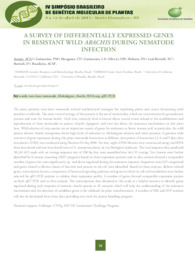A survey of differentially expressed genes in resistant wild arachis during nematode infection.
A survey of differentially expressed genes in resistant wild arachis during nematode infection.
Autoria: ARAUJO, A. C. G. de; MORGANTE, C. V.; GUIMARAES, P. M.; SILVA JUNIOR, O. B. da; ROBERTS, P. A.; BERTIOLI, S. C. de M. L.; BERTIOLI, D.; BRASILEIRO, A. C. M.
Resumo: The plant parasitic root-knot nematode evolved sophisticated strategies for exploiting plants and causes devastating yield penalties worldwide. The main control strategy of this parasite is the use of nematicides, which are contaminants for groundwater systems and toxic for human health. Until now, relatively little is known about crucial events related to the establishment and eproduction of these nematodes in peanut (Arachis hypogaea), and even less about the resistance mechanisms on this plant host. Wild relatives of crop species are an important source of genes for resistance to biotic stresses and, in particular, the wild peanut relative Arachis stenosperma shows high levels of resistance to Meloidogyne arenaria and other parasites. A genome-wide overview of gene expression during this plant nematode interaction at different time points of interaction [3, 6 and 9 days after inoculation (DAI)] was conducted using Illumina Hi-Seq 2000. For that, eight cDNA libraries were constructed using total RNA from inoculated and non inoculated roots of A. stenorpema plants, in two biological replicates. The total sequence data produced 38,241.633 reads with an average sequence size of 200 bp that were assembled into 44,133 contigs. Ten clusters were further identified by K-means clustering (MEV program) based on their expression patterns and in silico analysis showed a comparable number of genes that were significantly up- and down-regulated during the resistance response. Sequences were GO categorized and genes related to diverse classes of function and process in the cell were identified. Based on these analyses, defence-related genes, transcription factors, components of hormonal signaling pathways and genes involved on cell wall metabolism were further selected for qRT-PCR analysis to validate their expression profile. A number of genes showed comparable expression pattern on both qRT-PCR and in silico analysis. The transcriptome data obtained in this study is a helpful resource to identify genes regulated during early response of resistant Arachis species to M. arenaria which will help the understanding of the resistance mechanisms and the selection of candidate genes to be validated via plant transformation. A number of SSR and SNP markers will also be developed from these data providing new tools for peanut breeding program.
Ano de publicação: 2013
Tipo de publicação: Resumo em anais e proceedings
Unidade: Embrapa Semiárido
Palavras-chave: Amendoim, Arachis, Doença, Meloidogyne, Nematóide das galhas, Root-knot nematode
Observações
1 - Por padrão são exibidas publicações dos últimos 20 anos. Para encontrar publicações mais antigas, configure o filtro ano de publicação, colocando o ano a partir do qual você deseja encontrar publicações. O filtro está na coluna da esquerda na busca acima.
2 - Para ler algumas publicações da Embrapa (apenas as que estão em formato ePub), é necessário ter, no celular ou computador, um desses softwares gratuitos. Sistemas Android: Google Play Livros; IOS: iBooks; Windows e Linux: software Calibre.
Acesse outras publicações
Acesse a Base de Dados da Pesquisa Agropecuária (BDPA) para consultar o acervo completo das bibliotecas da Embrapa.

